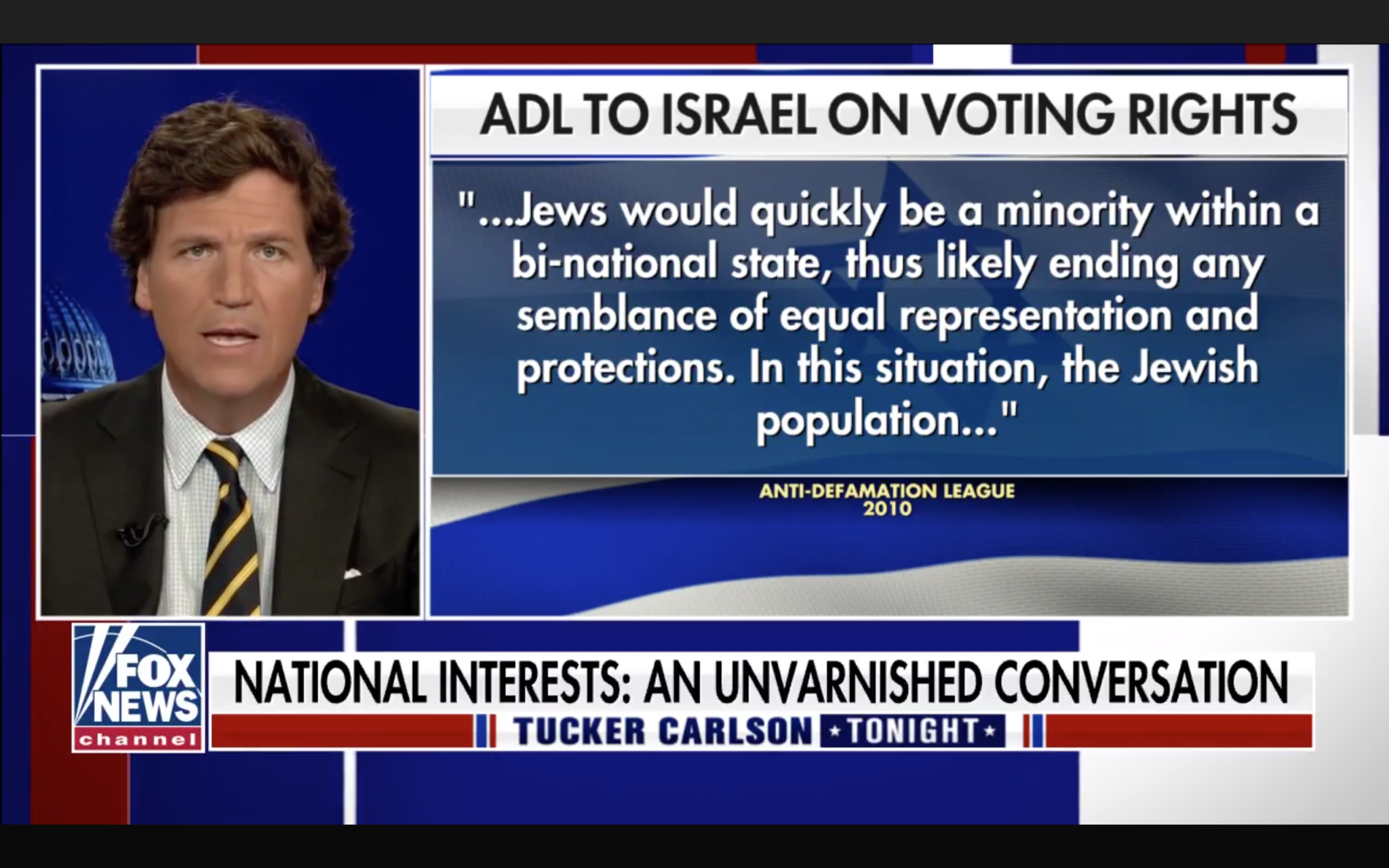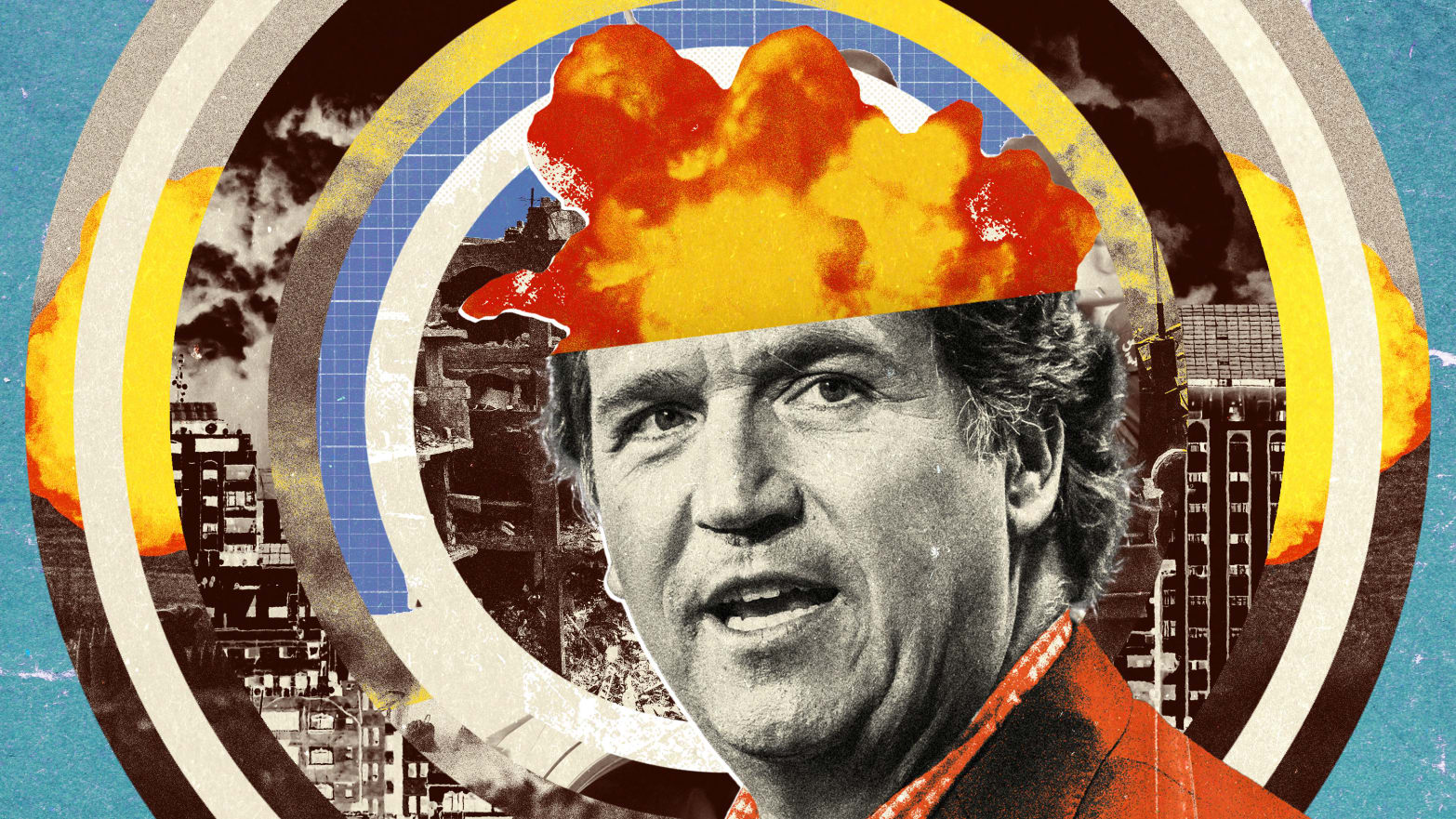Tucker Carlson And Israel: A Deep Dive Into Politics, Media, And Public Opinion
Let’s cut right to the chase. Tucker Carlson is one of the most polarizing figures in American media today, and his views on Israel have sparked heated debates across the political spectrum. Whether you love him or hate him, there’s no denying that Carlson has a knack for stirring the pot and sparking conversations that make people uncomfortable. When it comes to Israel, his commentary often walks a fine line between criticism and controversy. So, what’s the deal with Tucker Carlson and Israel? Let’s break it down.
Tucker Carlson isn’t just another talking head on TV. He’s a media powerhouse with millions of viewers tuning in every night to hear his take on the world. His show, "Tucker Carlson Tonight," has consistently been one of the highest-rated programs on cable news. And when he talks about Israel, people listen. But what exactly does he say? Is he pro-Israel, anti-Israel, or somewhere in between? The answer isn’t as simple as you might think.
This article isn’t here to pick sides. Instead, we’re going to dive deep into the relationship between Tucker Carlson and Israel, exploring his public statements, the context behind them, and how they fit into the broader geopolitical landscape. Whether you’re a fan of Carlson or not, understanding his perspective on Israel is crucial for anyone interested in the intersection of politics, media, and public opinion.
Read also:Rachel Zegler Allure Magazine March 2025 A Stunning Journey Into Fame
Who Is Tucker Carlson? A Quick Bio
Before we get into the nitty-gritty of Tucker Carlson’s views on Israel, let’s take a moment to understand who he is. Tucker Carlson is an American conservative television host, commentator, and author. Born on August 1, 1969, in Stanford, California, Carlson has carved out a career as one of the most influential voices in modern conservative media. Below is a quick overview of his life and career:
| Full Name | Tucker Scott Carlson |
|---|---|
| Date of Birth | August 1, 1969 |
| Place of Birth | Stanford, California |
| Education | Harvard University (B.A.), Oxford University (M.A.) |
| Occupation | Television Host, Commentator, Author |
| Notable Works | "Tucker Carlson Tonight," "Ship of Fools," "The Way the World Ends" |
Carlson’s rise to fame began in the early 2000s when he co-founded the news website The Daily Caller. From there, he moved on to Fox News, where he eventually became the host of "Tucker Carlson Tonight." Known for his sharp wit and unapologetic style, Carlson has become a lightning rod for both praise and criticism. Now, let’s see how his views on Israel fit into this larger picture.
Table of Contents
- Tucker Carlson's Early Views on Israel
- Carlson's Modern Perspective on Israel
- Criticism of Carlson's Stance
- Support for Carlson's Stance
- How Israel Responds to Carlson
- Public Opinion on Carlson and Israel
- The Geopolitical Impact of Carlson's Views
- The Role of Media in Shaping Views
- Where Is This Going? Future Direction
- Conclusion: What It All Means
Tucker Carlson's Early Views on Israel
Back in the day, Tucker Carlson’s views on Israel were relatively straightforward. Like many conservatives, he supported Israel as a key ally in the Middle East. This was during a time when the U.S.-Israel relationship was largely seen as a bipartisan issue. Carlson, being a staunch conservative, naturally aligned himself with the pro-Israel stance that dominated much of American politics.
However, as the political landscape shifted and the conversation around Israel became more complex, Carlson’s views began to evolve. He started questioning the traditional narrative that Israel could do no wrong. This shift wasn’t just about Israel; it was part of a broader critique of U.S. foreign policy that Carlson had been developing over the years.
Key Moments in His Early Career
- Carlson’s early days at The Daily Caller, where he often wrote about the Middle East.
- His initial support for Israel during the Gaza conflicts.
- Early criticisms of U.S. aid to Israel, which were relatively muted compared to his later statements.
Carlson's Modern Perspective on Israel
Fast forward to today, and Tucker Carlson’s views on Israel have taken a more critical tone. He’s no longer afraid to challenge the conventional wisdom surrounding Israel’s actions in the region. In fact, Carlson has become one of the most vocal critics of Israel’s treatment of Palestinians, particularly in the occupied territories.
Carlson’s modern perspective is rooted in his belief that the U.S. should not blindly support any country, including Israel, without questioning its actions. He argues that America’s unconditional support for Israel has come at a cost, both financially and morally. This stance has earned him praise from some quarters and condemnation from others.
Read also:Real Housewives Superfan Anna Faris Would Freak Out If Asked To Guest Star I Like To Hide Behind A Character Exclusive
Why the Shift?
- Changing geopolitical dynamics in the Middle East.
- Increased awareness of human rights issues in the region.
- Carlson’s growing skepticism of U.S. foreign policy interventions.
Criticism of Carlson's Stance
Of course, not everyone agrees with Tucker Carlson’s take on Israel. Critics argue that his criticism of Israel is overly simplistic and ignores the complexities of the conflict. Some even accuse him of harboring anti-Semitic sentiments, though Carlson has repeatedly denied these allegations.
The criticism doesn’t stop there. Many pro-Israel groups have condemned Carlson for what they see as a betrayal of conservative values. They argue that his stance undermines the strong U.S.-Israel alliance that has been a cornerstone of American foreign policy for decades.
Common Criticisms
- Accusations of anti-Semitism.
- Claims that he oversimplifies the Israel-Palestine conflict.
- Concerns that his views could harm U.S.-Israel relations.
Support for Carlson's Stance
On the flip side, Carlson has garnered support from those who believe it’s time for a more honest conversation about Israel. His critics may not like it, but many Americans are tired of the same old talking points when it comes to the Middle East. Carlson’s willingness to challenge the status quo resonates with people who feel that the U.S. has been too quick to take sides in a complicated conflict.
Supporters argue that Carlson’s views are rooted in a desire for peace and justice for all parties involved. They see his criticism of Israel as a necessary step toward achieving a lasting solution to the conflict.
Who Supports Carlson?
- Progressives who oppose U.S. military interventions abroad.
- People who believe in holding all countries accountable for human rights violations.
- Those who feel that the U.S. should prioritize its own interests over those of foreign allies.
How Israel Responds to Carlson
Israel’s response to Tucker Carlson has been mixed. While some Israeli officials have dismissed his criticisms as misguided or uninformed, others have taken a more measured approach. They acknowledge that Carlson’s views reflect a growing trend of skepticism toward Israel in certain segments of American society.
Interestingly, Carlson’s criticism of Israel hasn’t gone unnoticed by the Israeli public. Some Israelis appreciate his willingness to challenge the narrative, while others see him as a threat to the U.S.-Israel relationship.
Key Points from Israeli Officials
- Statements from Israeli diplomats addressing Carlson’s comments.
- Public reactions from Israeli citizens and media outlets.
- Efforts by Israel to counter Carlson’s narrative in the U.S. media.
Public Opinion on Carlson and Israel
Public opinion on Tucker Carlson and Israel is deeply divided. For every person who agrees with his critique of Israel, there’s someone else who thinks he’s going too far. This division reflects the broader polarization in American politics, where even issues like foreign policy can become deeply partisan.
Surveys and polls show that Carlson’s views on Israel resonate more with younger Americans, who tend to be more critical of Israel’s actions in the region. Older generations, on the other hand, are more likely to support Israel and view Carlson’s criticism as unwarranted.
What the Numbers Say
- Recent polls showing public opinion on Israel and the Middle East.
- Trends in how different demographics view Carlson’s stance.
- Impact of Carlson’s commentary on public discourse.
The Geopolitical Impact of Carlson's Views
Tucker Carlson’s views on Israel don’t exist in a vacuum. They’re part of a larger geopolitical conversation about the role of the U.S. in the Middle East. By challenging the traditional narrative surrounding Israel, Carlson is contributing to a shift in how Americans think about foreign policy.
This shift could have far-reaching consequences, not just for U.S.-Israel relations but for the broader Middle East as well. As more voices join the conversation, the pressure on policymakers to rethink their approach to the region will only increase.
The Role of Media in Shaping Views
Media plays a crucial role in shaping public opinion on issues like Israel. Tucker Carlson’s platform on Fox News gives him a massive audience, allowing him to influence the conversation in ways that few others can. Whether you agree with him or not, there’s no denying that his commentary has a significant impact on how people think about Israel.
At the same time, Carlson’s views are part of a larger media ecosystem that includes voices from across the political spectrum. This diversity of perspectives is essential for fostering a healthy debate about complex issues like the Israel-Palestine conflict.
Where Is This Going? Future Direction
Looking ahead, it’s clear that Tucker Carlson’s views on Israel will continue to be a topic of discussion. As the political landscape evolves, so too will the conversation around U.S.-Israel relations. Carlson’s role in this conversation will likely grow, as he continues to push boundaries and challenge conventional wisdom.
What does the future hold for Tucker Carlson and Israel? Only time will tell. But one thing is certain: the debate over Israel will remain a central issue in American politics for years to come.
Conclusion: What It All Means
In conclusion, Tucker Carlson’s views on Israel are a reflection of a broader shift in how Americans think about foreign policy. While his critics may disagree with his stance, there’s no denying that he’s contributing to a much-needed conversation about the U.S.-Israel relationship. Whether you love him or hate him, Carlson’s commentary has a significant impact on public discourse.
So, what’s next? It’s up to all of us to engage in this conversation and make our voices heard. Whether you agree with Carlson or not, the most important thing is to stay informed and think critically about the issues at hand. Share this article, leave a comment, and let’s keep the conversation going.
Article Recommendations


